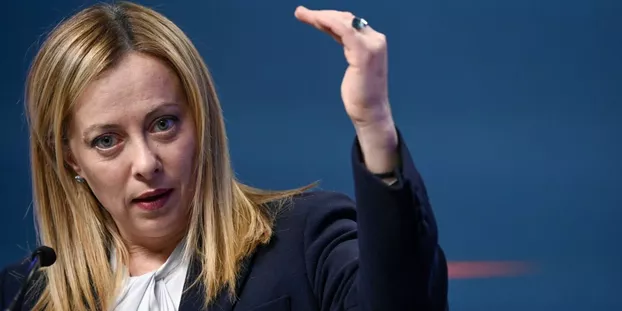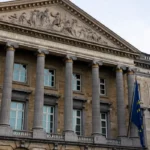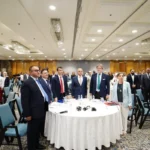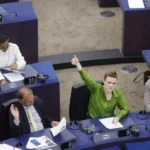On Sunday, Giorgia Meloni welcomed the leaders of the Mediterranean countries to Rome on Sunday for an “international conference” intended to extend the model agreement signed by the EU with Tunisia. The aim is to curb the arrival of migrants on the Old Continent.
Giorgia Meloni welcomed the leaders of the Mediterranean countries to Rome on Sunday for an “international conference” intended to extend the model agreement signed by the EU with Tunisia with the aim of curbing the arrival of migrants on the Old Continent. The far-right Italian Prime Minister opened the conference shortly after 1:00 p.m. in the presence of leaders from the region, the European Union and international financial institutions.
Among them, the presidents of Tunisia Kais Saied, of the United Arab Emirates Mohammed bin Zayed, of Mauritania Mohamed Ould Cheikh El Ghazouani, the president of the European Commission Ursula von der Leyen and the president of the European Council Charles Michel, as well as the High Commissioner of the UNHCR, Filippo Grandi. Malta, Egypt, Libya, Ethiopia, Jordan, Algeria, Niger, Lebanon are also represented by their heads of government, while others, such as Greece, Turkey, Kuwait or Saudi Arabia, have sent ministers. France and Spain have no representatives
Shortly before, at the Vatican, Pope Francis celebrating the Angelus called on European and African heads of state and government to bring “rescue and assistance” to migrants crossing the Mediterranean but also to those who, as in Tunisia and Libya, “are trapped and abandoned in desert areas”. “The Mediterranean must never again be the scene of death and inhumanity,” said the Argentine pontiff.
Conference sessions scheduled for the afternoon are closed to the media. A press conference by Giorgia Meloni is announced after 7:00 p.m. (5:00 p.m. GMT).
“Not perfect democracies”
During the 2022 legislative campaign that brought her to power, Giorgia Meloni had promised to “stop the landings” of migrants in Italy. His government has since put sticks in the propellers of humanitarian ships, without however drying up departures.
According to Rome, some 80,000 people have crossed the Mediterranean and arrived on the coasts of the peninsula since the beginning of the year, against 33,000 last year over the same period, mostly from the Tunisian coast.
Faced with this observation, Giorgia Meloni and the European Commission have intensified their “dialogue” with Tunisia for several months, promising funding if the country undertakes to combat emigration from its territory. Brussels and Rome thus signed last week with the Tunisian president a memorandum of understanding which notably provides for European aid of 105 million euros intended to prevent the departure of migrant boats and to fight against smugglers.
The agreement also provides for more returns of Tunisians in an irregular situation in the EU, as well as returns from Tunisia to their countries of origin of migrants from sub-Saharan Africa. “This partnership with Tunisia must be a model for building new relations with our neighbors in North Africa”, pleaded Giorgia Meloni in Tunis with Ursula von der Leyen.
A senior EU official speaking on condition of anonymity confirmed that the EU is keen to negotiate similar partnerships with Egypt and Morocco. “We must cooperate with the countries of North Africa even if for that we must accept that they are not perfect democracies”, adds an ambassador stationed in Rome who requested anonymity. “There is unity in the EU on this principle,” he told AFP.
“Crime scene”
The NGOs, on the other hand, are standing up. Sea-Watch regrets that “the EU and its member states continue to toughen their deadly policies of isolation”. “The Mediterranean is not just a cemetery, it is a crime scene”, denounces the organization. “Europe has learned nothing from its complicity in the atrocious abuses committed against migrants in Libya,” Human Rights Watch said.
For the independent researcher Yves Pascouau, the fact that there is a “discussion channel” between Europe and the countries of departure is a positive thing. It is nevertheless worrying to note that now “migration is also considered by the countries of the South as a problem”. And as long as migration policies depend on European interior ministers, the issue will only be addressed from a security point of view.
This article is originally published on europe1.fr







